
Every content creator, SEO specialist, and digital marketer dreams of seeing their website rank high on search engines. However, it’s easier said than done, with search engines' dynamically evolving algorithms changing the criteria for higher ranking. However, there’s still a sneaky little trick you can use to see quick results with less money, although at your risk. And the name of that trick is parasite SEO.
So, what is parasite SEO?
As far as traditional SEO is concerned, well-established URLs that rank well for your preferred keywords are no longer meaningful because Google ranks different types of content according to different parameters; therefore, it is possible for the existing type of content on your website not to rank on the terms you need.
Parasite SEO is the way to go when you want to rank for specific keywords by publishing quality content on an established, authoritative external site. This enables you to benefit from the high traffic the host generates and present your products as suitable investments. These high DR websites have large amounts of authority and trust in the eyes of Google. This means that, with parasite SEO, you can post an article on an external site and ride on the coattails of that authoritative website into search results, all while building backlinks for an affiliate program promotion. Are you interested in learning how parasite SEO works? This blog is just for you.
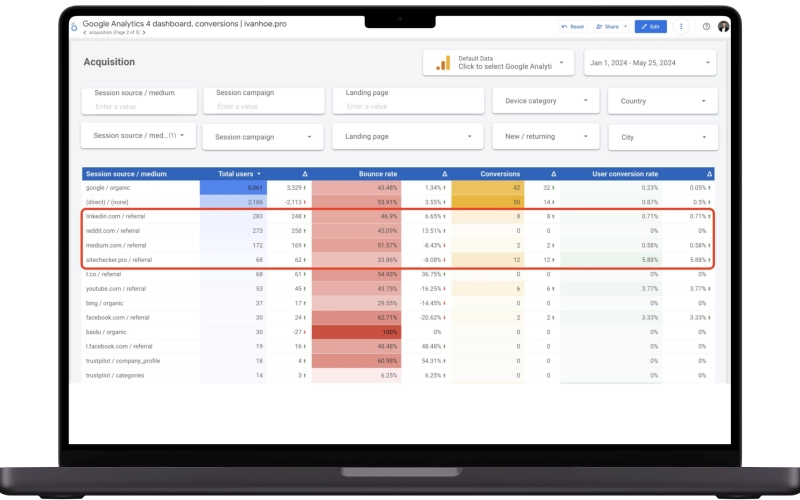
Because the public has endorsed them for their credibility, Google supports established websites like Amazon and YouTube. So, you can use their public trust and authority to fill your desired page with links or dump tons of content on it and go after primary keywords, hijacking all the trust from that site rather than building up your own. This may sound like black-hat SEO, even unethical, but if you want quick results, it can work in the short term. Some more merits and demerits of parasite SEO include:
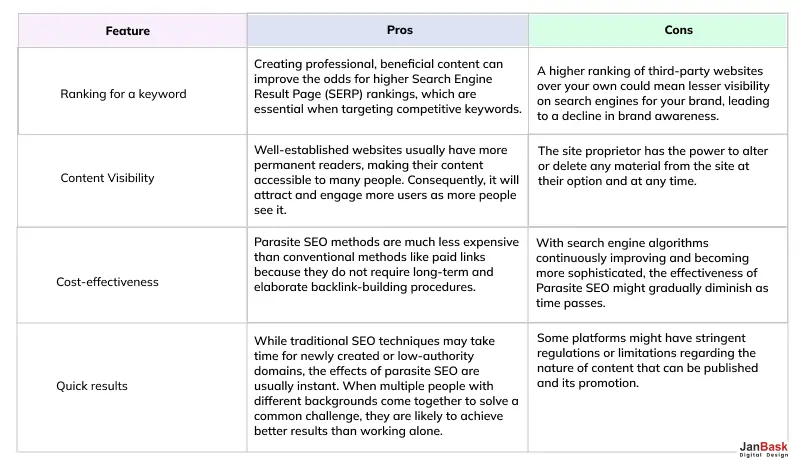
Because you can share the authority of a large website, you can access its organic traffic and, by extension, receive vast amounts of links every time. Therefore, it’s better than adding several thousand links to an ordinary commercial site, which would probably not be noticed.
However, in the case of a parasite, there is no way but up. Additionally, some measures can be taken that would instead lead to a page ban usually; things like keyword stuffing, excessive optimization, or spammy backlinking could lead one to face loss, but on a parasite, there are no such issues to be faced.
There are many ways to practice parasite search engine optimization. An example would be guest blogging on famous blogs with links to the host's site, creating profiles on professional websites such as LinkedIn with embedded links in the bio section, or using the user-generated content space of heavily populated sites to insert links in forum posts or comments.
Unlock the Truth: Discover Parasite SEO's Real Potential!

Parasite SEO is a wrong way of optimizing online content to make search engines rank it higher on high-ranking URLs through borrowed reliability. This procedure helps get fast results from the platforms above since they are mainly used for ultra-competitive search word queries. Let's look into some of the most common examples of Parasite SEO used to manipulate search engine results.
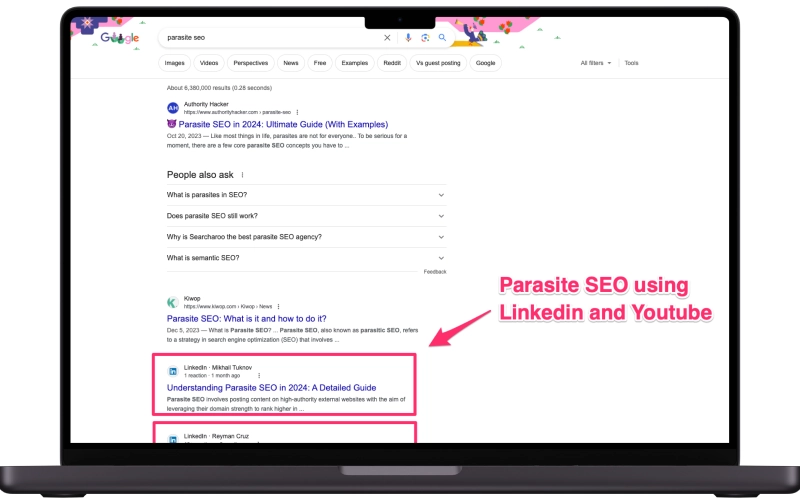
Typical approaches include using user-generated content (UGC) spaces on high-ranking sites. For example, criminals may create accounts in popular online forums or blogs, which they can use to make posts or send messages. Unlike ordinary guest blogging or commenting, these operations necessitate cramming links and employing deceptive anchor texts to meddle with search engines' positioning algorithms.
You can also launch landing pages on sites with high domain authority, such as educational websites, non-profit sites, or famous community pages. These pages are designed to host outbound SEO links. In more stealthy cases, parasites spot and utilize forgotten yet powerful pages, injecting viral links or sending the page's traffic to destinations that were not wanted in the first place.
That is precisely what occurred with Outlook India (do not be anxious; it’s not a site anyone knows about outside the black-hat community!). In 2023, it was a parasite SEO’s fairy tale, apparently able to get high rankings for almost all topics. It published materials ranging from “best mushroom coffee” through “best dating sites” to “best nootropics.” However, it soon ran out of luck when Google penalized it for practicing parasite SEO.
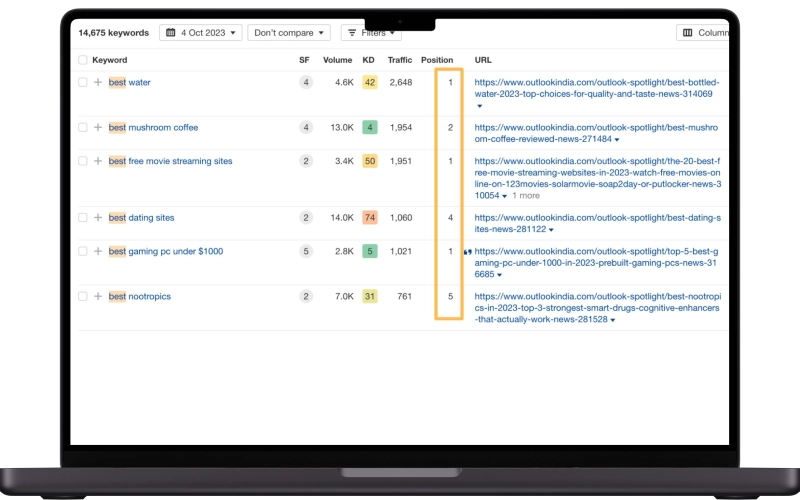

Another strategy that takes advantage of expired domains is that they still maintain some search engine optimization (SEO) worth because of their previous backlinks from trustworthy sources. The expiration of specific Internet addresses allows those acquiring them to turn them into hyperlink hosts or redirect agents, leading to unreliable sites. Some people go as far as hacking into rightful websites and implanting unwanted links without notifying the rightful owners of such sites.

Parasites can use web pages, including blogs and sites anywhere on the Internet, to create intermediate pages and establish a linkage with a host site. Such buffer sites are interlinked, with one leading to another until they reach their intended destination site. Doing so can hide the visibility of direct connection insertions from reputable websites to this place.
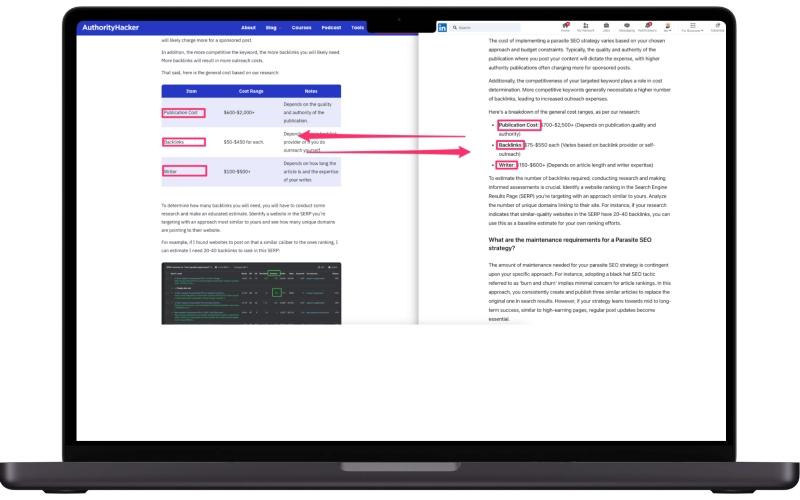
Here is where someone repurposed existing content and published it on LinkedIn.
Article syndication is distributing articles to different platforms to get backlinks. This tactic is taken to an unethical level in Parasite SEO by spinning or slightly changing existing content (a technique that rewrites existing articles so that plagiarism detectors cannot detect them). These spun articles are published on numerous highly authoritative websites to maximize backlink effectiveness.
Obviously!
When a website employs Parasite SEO, it reaps many benefits in the short run. Such a practice usually results in increased ranks for sites employing it. This happens because Google and other search engines consider links from sites with the highest authority as recommendations, thus boosting a website's value and trust. However, these rankings are just an illusion of success because search engines keep changing their algorithms so that they can detect such tricks and punish them with penalties.
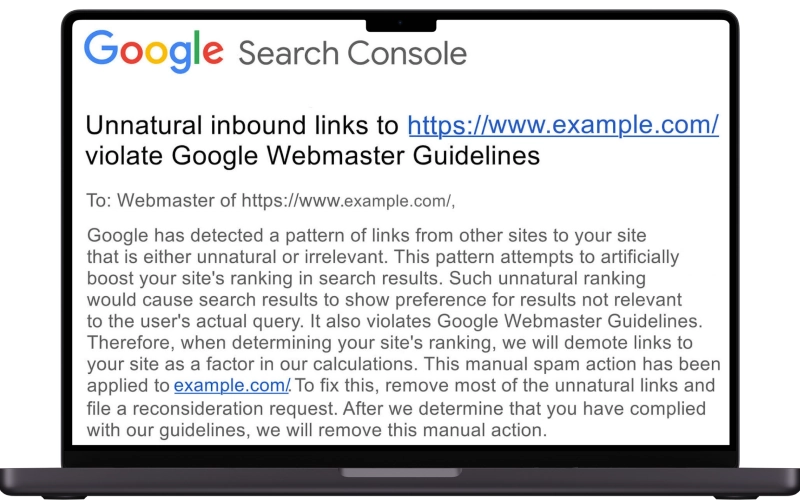
The consequences can be disastrous for your online reputation if a search engine has discovered that your website used dubious techniques like Parasite SEO to achieve its current rank. Generally speaking, the initial consequence is an abrupt drop in rankings. Search engines want visitors to get only the most pertinent and reliable information. Hence, ranking well on any result page becomes almost impossible when they find out about any site using unfair tactics. Consequently, there will be a noticeable decrease in natural traffic that directly equates to less money for numerous firms.
Moreover, reliance on such strategies can lead the businesses in question to engage in unsustainable methods of achieving search engine optimization objectives, ultimately becoming too dependent on them. If we do not clarify this essential thing from the outset, we could say that all businesses should operate like parasites by using host sites or backlinks exclusively as their traffic sources.
This terrible idea would lead to problems for your organization within and outside its environment because it would allow others to control your site’s success. An SEO plan that relies heavily on such methods is nothing more than an attempt to make quick wins without considering the long-term consequences of such practices. The dangers here are that firms become exposed to algorithm adjustments within search engines, thus reducing their visibility rates online and diverting funds into less valuable SEO strategies.
The cost of parasite SEO will vary depending on your strategy and budget. It is important to note that the more prestigious the website where you post your content, the more it will cost; in other words, higher authority publications are likely to charge expensively for a sponsored post. Also, if your keywords are very competitive, you will likely require more backlinks. This means that when you have more backlinks, outreach expenses will increase. These points considered, here is what we found out to be the average costs:

You must research and make an intelligent guess to determine how many backlinks you will need. Choose a site in the SERP that you want to target with an approach very similar to yours, and check out the number of unique domains linking to their site.
Yes! Parasite SEO employs the most significant number of sources to boost a site's rankings, which could serve valuable purposes. By doing so, anything published within this ecosystem would meet the demands of an already developed SEO parameter of all web pages under consideration. However, a temporary tactic may seem unsafe if the host site alters rules or deletes your content. It's essential for continuity and value in information so that advantages last long.
High-authority platforms like Medium, WordPress.com, or LinkedIn are ideal for parasite SEO. These sites have robust domain authority, elevating the visibility of your content. Nevertheless, selecting a site based on your niche and target audience is wise. Ensure that the site you choose always reflects the purpose of your content and audience needs.
Parasite content is called when published on websites with high authority you do not own. This helps you benefit from the host site's SEO power, making your content more visible. Although this method may temporarily improve your rankings in search engines, it depends on the policies and algorithms of the host site.
Parasite SEO intends to quickly rank content and boost exposure by leveraging high-authority sites. The system allows content to obtain host sites' already established domain authority. This method is usually employed to obtain temporary SEO benefits or evaluate the efficiency of custom materials before committing to lengthy plans.
The usage of parasite SEO can be compared to how a parasite feeds off its host. For any web page to gain a higher ranking in its specific niche searches, it has to be part of a domain where SEO is more vital than can be found in the target material being promoted. The name parasites also represents such dependence. It shows that this method should only last a while when working with other organic traffic sources, only understanding their importance; otherwise, they would never want to associate themselves with such sites anymore.
The Google parasite SEO update means modifications made to the algorithms to help minimize the effect of parasite SEO strategies. Sacrificing those utilized at an excessive rate will increase search results' quality and punish those who use them additionally. Such updates are thus in charge of protecting legitimate websites from this unethical behavior by promoting pure searching processes through their quality improvement and parsimony. This will help mitigate these penalties.
Resolve technical issues such as:
Parasite SEO can be risky, as your content will live on someone else's website, and you may face volatility-related challenges and potential loss of control. Furthermore, you'll need to consider whether you want to adopt a white-hat or black-hat approach, focusing on ethical strategies and potentially employing more aggressive and non-compliant tactics.
Ultimately, parasite SEO's success hinges on finding the right balance between leveraging the authority of established websites and maintaining a sustainable SEO strategy. To ensure continued success, it's essential to keep a watchful eye on the ever-evolving landscape of SEO, adapt to changes, and remain flexible in your approach. Else, you can simply delegate your SEO efforts to JanBask’s top-notch SEO services for continued success.
Interested in our Seo Services

Leave a Reply